Elia Guerra
Energy Minimization for Participatory Federated Learning in IoT Analyzed via Game Theory
Mar 27, 2025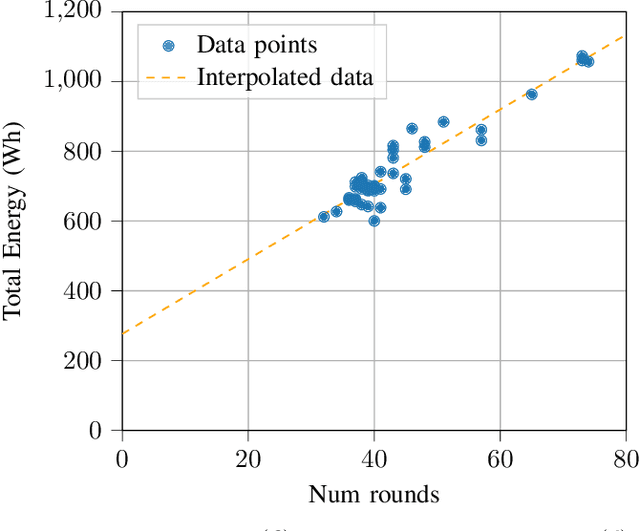
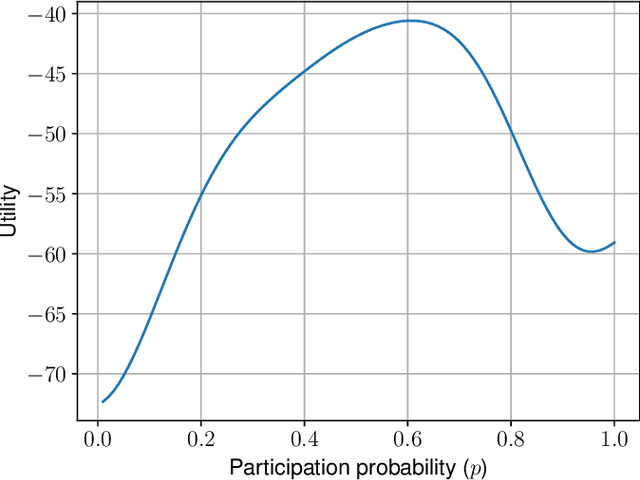
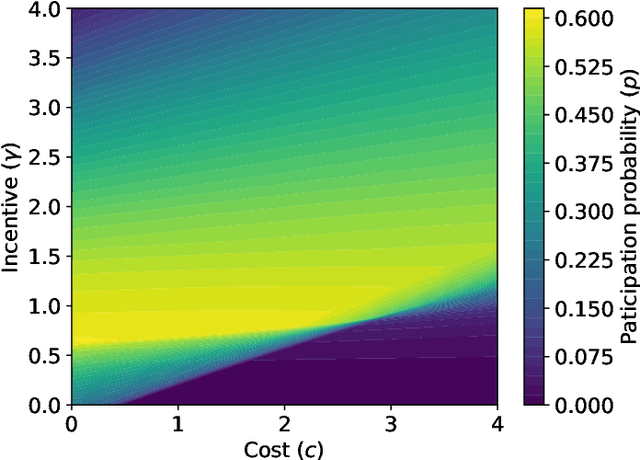
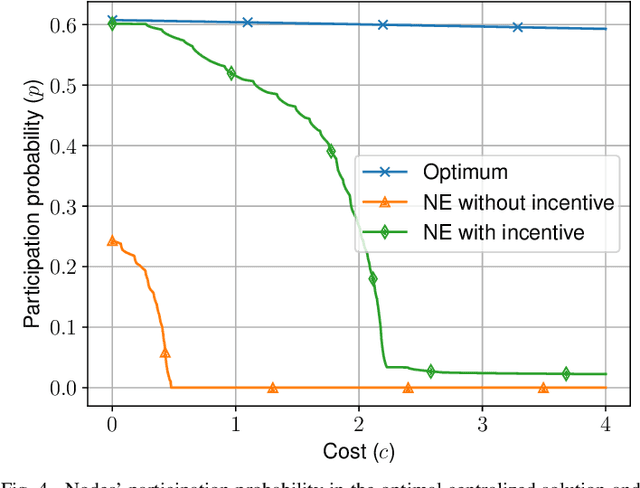
Abstract:The Internet of Things requires intelligent decision making in many scenarios. To this end, resources available at the individual nodes for sensing or computing, or both, can be leveraged. This results in approaches known as participatory sensing and federated learning, respectively. We investigate the simultaneous implementation of both, through a distributed approach based on empowering local nodes with game theoretic decision making. A global objective of energy minimization is combined with the individual node's optimization of local expenditure for sensing and transmitting data over multiple learning rounds. We present extensive evaluations of this technique, based on both a theoretical framework and experiments in a simulated network scenario with real data. Such a distributed approach can reach a desired level of accuracy for federated learning without a centralized supervision of the data collector. However, depending on the weight attributed to the local costs of the single node, it may also result in a significantly high Price of Anarchy (from 1.28 onwards). Thus, we argue for the need of incentive mechanisms, possibly based on Age of Information of the single nodes.
* 6 pages, 6 figures, 2 tables, conference
Energy-Aware Decentralized Learning with Intermittent Model Training
Jul 01, 2024



Abstract:Decentralized learning (DL) offers a powerful framework where nodes collaboratively train models without sharing raw data and without the coordination of a central server. In the iterative rounds of DL, models are trained locally, shared with neighbors in the topology, and aggregated with other models received from neighbors. Sharing and merging models contribute to convergence towards a consensus model that generalizes better across the collective data captured at training time. In addition, the energy consumption while sharing and merging model parameters is negligible compared to the energy spent during the training phase. Leveraging this fact, we present SkipTrain, a novel DL algorithm, which minimizes energy consumption in decentralized learning by strategically skipping some training rounds and substituting them with synchronization rounds. These training-silent periods, besides saving energy, also allow models to better mix and finally produce models with superior accuracy than typical DL algorithms that train at every round. Our empirical evaluations with 256 nodes demonstrate that SkipTrain reduces energy consumption by 50% and increases model accuracy by up to 12% compared to D-PSGD, the conventional DL algorithm.
The Implications of Decentralization in Blockchained Federated Learning: Evaluating the Impact of Model Staleness and Inconsistencies
Oct 11, 2023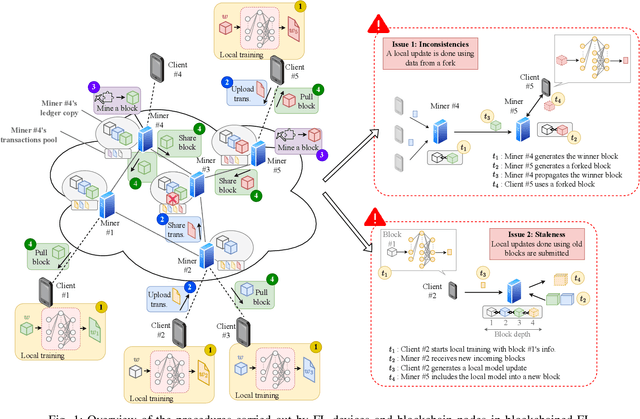
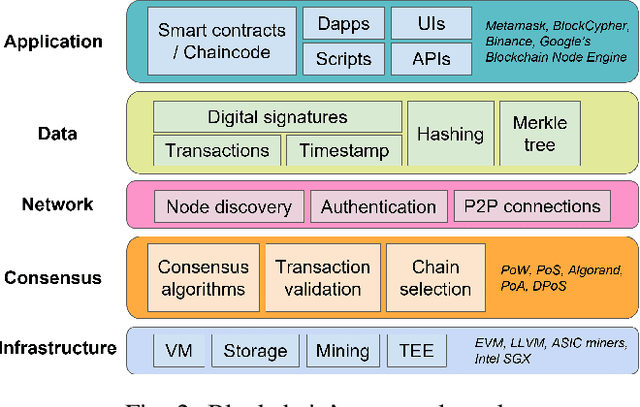
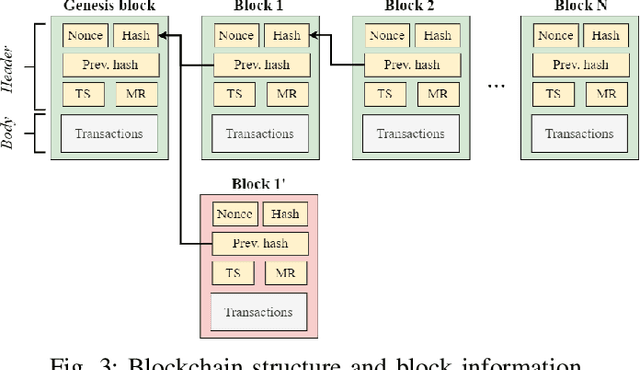
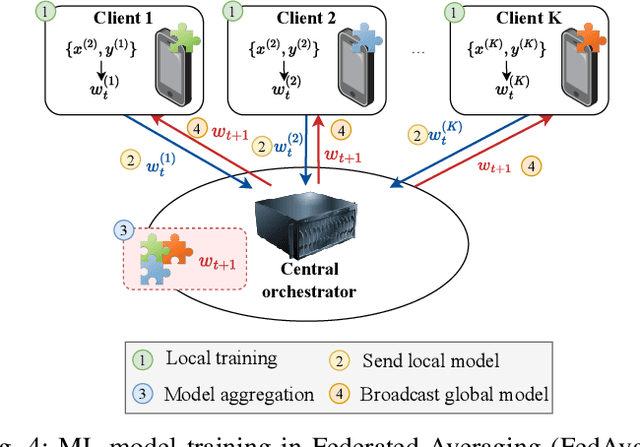
Abstract:Blockchain promises to enhance distributed machine learning (ML) approaches such as federated learning (FL) by providing further decentralization, security, immutability, and trust, which are key properties for enabling collaborative intelligence in next-generation applications. Nonetheless, the intrinsic decentralized operation of peer-to-peer (P2P) blockchain nodes leads to an uncharted setting for FL, whereby the concepts of FL round and global model become meaningless, as devices' synchronization is lost without the figure of a central orchestrating server. In this paper, we study the practical implications of outsourcing the orchestration of FL to a democratic network such as in a blockchain. In particular, we focus on the effects that model staleness and inconsistencies, endorsed by blockchains' modus operandi, have on the training procedure held by FL devices asynchronously. Using simulation, we evaluate the blockchained FL operation on the well-known CIFAR-10 dataset and focus on the accuracy and timeliness of the solutions. Our results show the high impact of model inconsistencies on the accuracy of the models (up to a ~35% decrease in prediction accuracy), which underscores the importance of properly designing blockchain systems based on the characteristics of the underlying FL application.
Towards Energy-Aware Federated Traffic Prediction for Cellular Networks
Sep 19, 2023Abstract:Cellular traffic prediction is a crucial activity for optimizing networks in fifth-generation (5G) networks and beyond, as accurate forecasting is essential for intelligent network design, resource allocation and anomaly mitigation. Although machine learning (ML) is a promising approach to effectively predict network traffic, the centralization of massive data in a single data center raises issues regarding confidentiality, privacy and data transfer demands. To address these challenges, federated learning (FL) emerges as an appealing ML training framework which offers high accurate predictions through parallel distributed computations. However, the environmental impact of these methods is often overlooked, which calls into question their sustainability. In this paper, we address the trade-off between accuracy and energy consumption in FL by proposing a novel sustainability indicator that allows assessing the feasibility of ML models. Then, we comprehensively evaluate state-of-the-art deep learning (DL) architectures in a federated scenario using real-world measurements from base station (BS) sites in the area of Barcelona, Spain. Our findings indicate that larger ML models achieve marginally improved performance but have a significant environmental impact in terms of carbon footprint, which make them impractical for real-world applications.
How Much Does It Cost to Train a Machine Learning Model over Distributed Data Sources?
Sep 15, 2022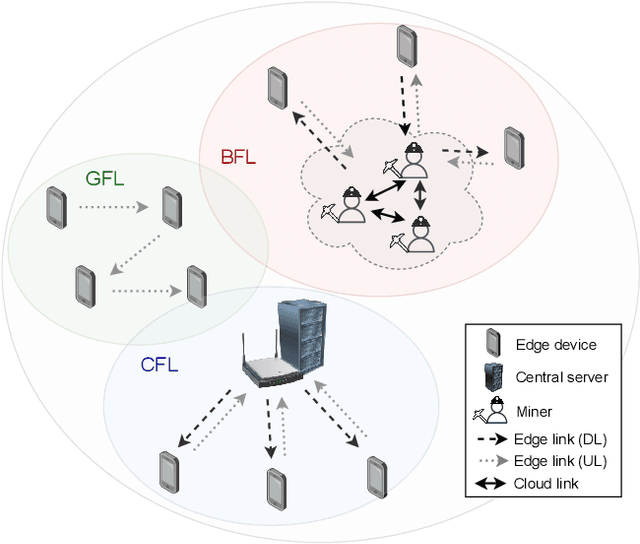

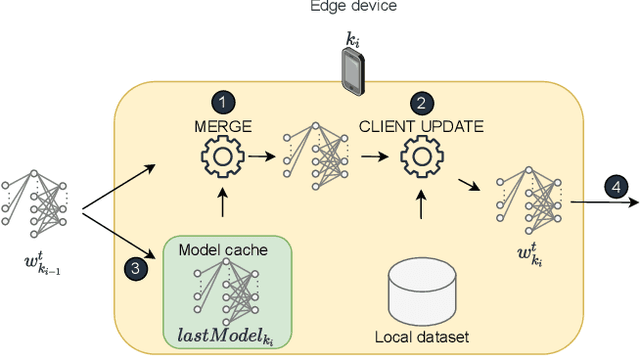
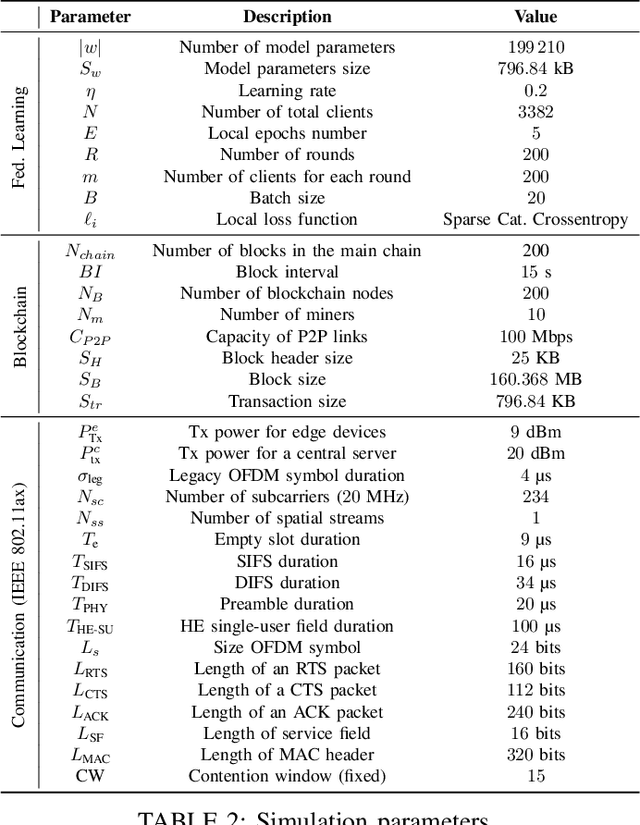
Abstract:Federated learning (FL) is one of the most appealing alternatives to the standard centralized learning paradigm, allowing heterogeneous set of devices to train a machine learning model without sharing their raw data. However, FL requires a central server to coordinate the learning process, thus introducing potential scalability and security issues. In the literature, server-less FL approaches like gossip federated learning (GFL) and blockchain-enabled federated learning (BFL) have been proposed to mitigate these issues. In this work, we propose a complete overview of these three techniques proposing a comparison according to an integral set of performance indicators, including model accuracy, time complexity, communication overhead, convergence time and energy consumption. An extensive simulation campaign permits to draw a quantitative analysis. In particular, GFL is able to save the 18% of training time, the 68% of energy and the 51% of data to be shared with respect to the CFL solution, but it is not able to reach the level of accuracy of CFL. On the other hand, BFL represents a viable solution for implementing decentralized learning with a higher level of security, at the cost of an extra energy usage and data sharing. Finally, we identify open issues on the two decentralized federated learning implementations and provide insights on potential extensions and possible research directions on this new research field.
On the Decentralization of Blockchain-enabled Asynchronous Federated Learning
May 20, 2022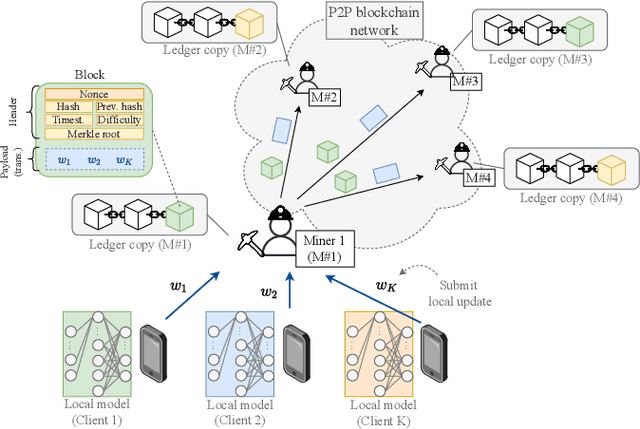
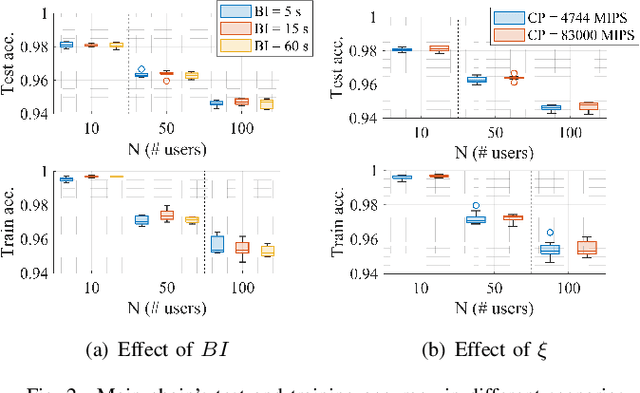
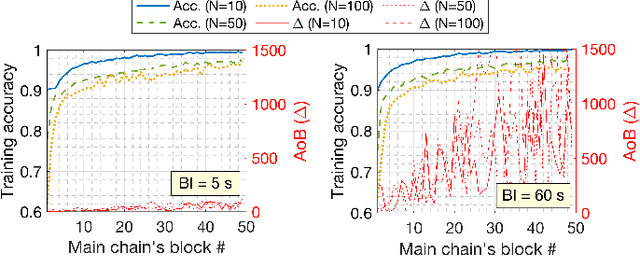
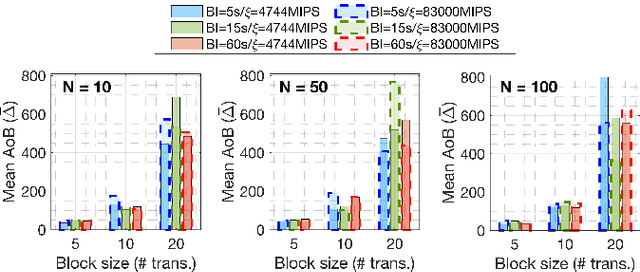
Abstract:Federated learning (FL), thanks in part to the emergence of the edge computing paradigm, is expected to enable true real-time applications in production environments. However, its original dependence on a central server for orchestration raises several concerns in terms of security, privacy, and scalability. To solve some of these worries, blockchain technology is expected to bring decentralization, robustness, and enhanced trust to FL. The empowerment of FL through blockchain (also referred to as FLchain), however, has some implications in terms of ledger inconsistencies and age of information (AoI), which are naturally inherited from the blockchain's fully decentralized operation. Such issues stem from the fact that, given the temporary ledger versions in the blockchain, FL devices may use different models for training, and that, given the asynchronicity of the FL operation, stale local updates (computed using outdated models) may be generated. In this paper, we shed light on the implications of the FLchain setting and study the effect that both the AoI and ledger inconsistencies have on the FL performance. To that end, we provide a faithful simulation tool that allows capturing the decentralized and asynchronous nature of the FLchain operation.
 Add to Chrome
Add to Chrome Add to Firefox
Add to Firefox Add to Edge
Add to Edge